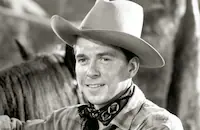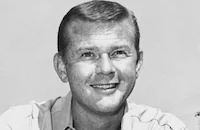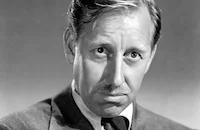Louisa

Brief Synopsis
Cast & Crew
Alexander Hall
Ronald Reagan
Charles Coburn
Ruth Hussey
Edmund Gwenn
Spring Byington
Film Details
Technical Specs

Synopsis
Architect Hal Norton returns to his Pleasantville home, laden with presents for his family in celebration of his promotion to vice-president of his company. To his dismay, Gladys the maid, Hal's son Chris, his seventeen-year-old daughter Cathy and his wife Meg all greet him with gloom and distress. Eventually Meg reveals that Hal's widowed mother Louisa, who lives with the family, is the cause of the trouble. Earlier that day, her complaints alienated the grocer, Gladys, Chris, Cathy and Meg. Reluctantly, Hal tells his mother that without realizing it, she has caused a lot of trouble and suggests that she find an interest outside the family. The next morning, a wounded Louisa decides to attend a meeting of the Ladies' Auxiliary, and on the way, stops to apologize to Henry Hammond, the grocer. The two fall into conversation and agree that they have become more irritable with old age, partly because they are lonely. Soon Louisa and Hammond begin a secret romance. One night, Cathy sees them holding hands at a movie, and rushes home to tell her family. A shocked Hal waits up for Louisa, who then shyly confesses that Hammond has proposed. When Hal's emotional distress affects his work, his boss, Abel Burnside, orders him to go home early. That night, Hammond comes to dinner at the Norton home. He charms everyone, including Cathy's boyfriend, Jimmy Blake, but Hal remains skeptical. At the dinner table, Hammond again proposes to Louisa, but before she can answer, Burnside arrives with the news that Hal's latest project must be finished immediately. Burnside is immediately smitten by Louisa, and when she responds to his attentions, the jealous Hammond storms out. For the rest of the weekend, Burnside courts Louisa, who is still preoccupied with Hammond. At a country club dance, Burnside and Louisa win a dance contest, but after Burnside defeats Hammond in an Indian wrestling match, Louisa hurries to Hammond's side and Burnside returns to the city. On Monday morning, Burnside presents Hal with a complete dossier on Hammond, which shows him to be a bigamist. Louisa, however, refuses to believe it, and when Hal forbids her to see Hammond, runs away. A frantic Hal calls the police. Later, Burnside arrives at the Nortons', and then Jimmy shows up to report seeing a woman in the window of Hammond's living quarters. Everyone rushes to Hammond's and discovers that Louisa is indeed there. Hammond explains that all four of the women he was supposed to have married were actually the same one. He and his first wife were so much in love that they remarried every ten years until she died. With this news, even Hal is forced to concede that Louisa has found happiness. Later Louisa's marriage to Hammond is witnessed by all her happy friends and family.

Director

Alexander Hall
Cast

Ronald Reagan

Charles Coburn

Ruth Hussey

Edmund Gwenn

Spring Byington

Piper Laurie

Scotty Beckett
Jimmy Hunt

Connie Gilchrist
Willard Waterman
Marjorie Crosland

Martin Milner
Terry Frost
Dave Willock
Ann Pearce

Frank Ferguson
Billy Newell
Eddie Parker
Bill Clauson
Rev. Neal Dodd
Laura Kasley Brooks
Chuck Courtney
William H. O'brien
Sherry Jackson
Barbara Wittlinger
Donna Norris
Diana Norris
Robert Miles
Howard Keiser
George Washburn
John Collum
Richard Mickelsen
Dell Henderson
Bob Bowman
Gay Gayle
Scotty Groves
Crew
Glenn E. Anderson
Robert Arthur
Robert Boyle
Leslie I. Carey
Milton Carruth
Russell A. Gausman
Maury Gertsman
Bernard Herzbrun
David S. Horsley
Joe Kenny
Ruby R. Levitt
Rosemary Odell
Stanley Roberts
Frank Skinner
Joan St. Oegger
Bud Westmore

Film Details
Technical Specs

Award Nominations
Best Sound
Articles
Loiusa -
The family gets in an uproar when Cathy spots her grandmother holding hands with Hammond in the movie theater, and when confronted by Hal, admits that Hammond has proposed marriage. Upset at the news, Hal is sent home from work by his boss, Mr. Burnside (Charles Coburn), and Hammond is invited to dinner that night, where he again proposes. During dinner, Burnside shows up and is captivated by Louisa and a rivalry begins. The jealous Burnside hires a detective and presents evidence that Hammond is really a bigamist. Also in the cast was former Little Rascals star Scotty Beckett as Cathy's boyfriend, Jimmy.
Unhappy with the types of roles being offered, Ronald Reagan had just ended his long-term contract with Warner Bros. when his agent, Lou Wasserman, negotiated a five-year, five-picture contract with Universal. Louisa was his first film with the stu-dio, and he enjoyed being reunited with Coburn, with whom he had worked on Kings Row (1942). The film was shot on the Universal lot in Burbank from February 2 - March 15, 1950.
Louisa was released on May 31, 1950 with the curmudgeonly The New York Times film critic Bosley Crowther highly praising it writing, "Who says that Hollywood movies are made solely for the teen-age crowd? Who says that love only happens to the youthful and the glamorous on the screen? Louisa [is] a jovial little picture about a gloriously giddy romance between a pleasantly plump grandmother and a beamingly 60ish swain." Crowther applauded writer Stanley Roberts for creating a film about older people who have been widowed, but rather than sitting at home decide to look for anoth-er mate. Crowther deemed Byington "darling [...] her radiance at the discovery of a new love should be more remedial than medicine in raising the spirits of people her age."
Louisa would be nominated for an Academy Award for Best Sound Recording and Spring Byington was nominated for a Golden Globe for Best Actress - Comedy or Musical for her performance. Byington and Charles Coburn made several films together, beginning with The Story of Alexander Graham Bell (1939), often playing a mar-ried couple, and the chemistry continued into television with her hit television show December Bride. Later, both Byington and Coburn would say publicly that of all the films they had made, Louisa was their favorite.
By Lorraine LoBianco

Loiusa -
Quotes
Trivia
Notes
Piper Laurie made her motion picture debut in this film, and Ronald Reagan was borrowed from Warner Bros. The picture received an Academy Award nomination in the Sound Recording category.

Miscellaneous Notes
Released in United States Summer August 1950
Released in United States Summer August 1950













